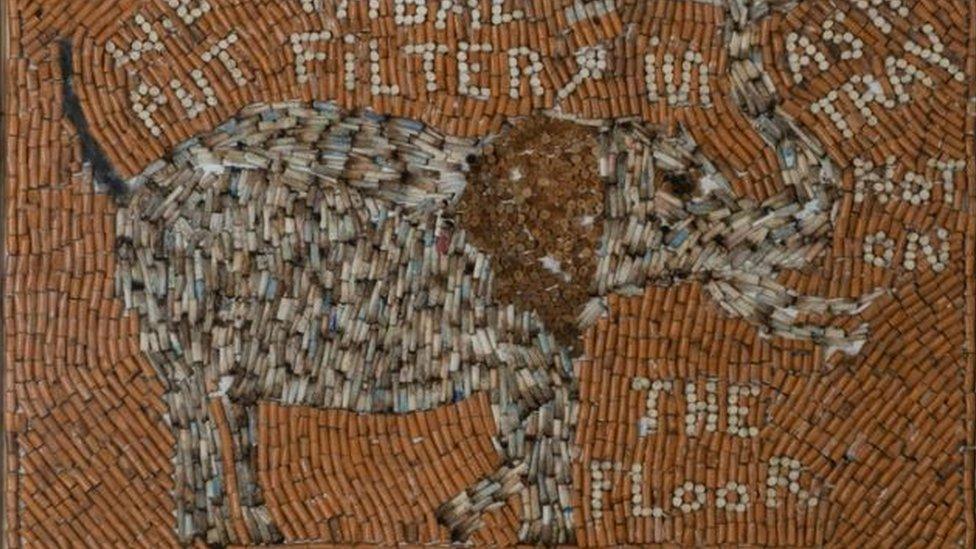Campaign #FillTheBottle aims to tidy up cigarette butts
- Published

Amel Talha, bottom right, first used the hashtag #FillTheBottle to launch the campaign
Cigarette butts - flicked into drains, mashed under foot or dropped in parks - are a common sight around the world.
But a campaign launched by a group of French teenagers to tidy them up has highlighted their environmental impact.
Amel Talha launched the hashtag #FillTheBottle after a friend collected cigarette butts in a water bottle and posted a photo on Twitter.
The campaign has inspired thousands to clean up what is thought to be the most common form of litter around the globe, external.
"This is a big problem in France but also all around the world," the 18-year-old tells the BBC, adding she is "extremely happy and proud" that the campaign has had such an effect.
Amel's friend Jason Prince first posted an image of a plastic water bottle filled to the cap with cigarette butts, external last Wednesday.
"20 minutes to fill this 1 litre bottle in an area of less than 50m," he wrote. "This is extremely serious."
Allow X content?
This article contains content provided by X. We ask for your permission before anything is loaded, as they may be using cookies and other technologies. You may want to read X’s cookie policy, external and privacy policy, external before accepting. To view this content choose ‘accept and continue’.

Another friend, Christian Musitu Swamu, retweeted the image. "It isn't much, but if everybody did it, that would be something cool," he wrote, prompting Amel to tweet: "#FillTheBottle would be cool I think".
Within 24 hours, thousands of photos, videos and tweets appeared using the hashtag. "I lost my words... to see that people liked it and took time to do it," Amel says.
Amel says she is in contact with the French company MéGo to dispose of the butts. MéGo collects and recycles filters, external, processing them at their factories to turn them into plastic products - including ashtrays.
What's in a cigarette butt?
Filters - which make up the ends or butts of the cigarette - are made of cellulose acetate, a synthetic product that is commercially derived from wood pulp. It has also been used to make magnetic tape, frames for glasses, and even the original Lego toy bricks.
"People think cigarettes are biodegradable," Nicola Boon at charity Keep Britain Tidy tells the BBC. "They know they're toxic, but they think the toxins disappear magically."
In fact, the charity says that, depending on conditions, it can take anywhere from 18 months to 10 years for the butts to entirely break down. This means cigarettes dropped on the street, stubbed out on the beach or put down drains can cause pollution for years.
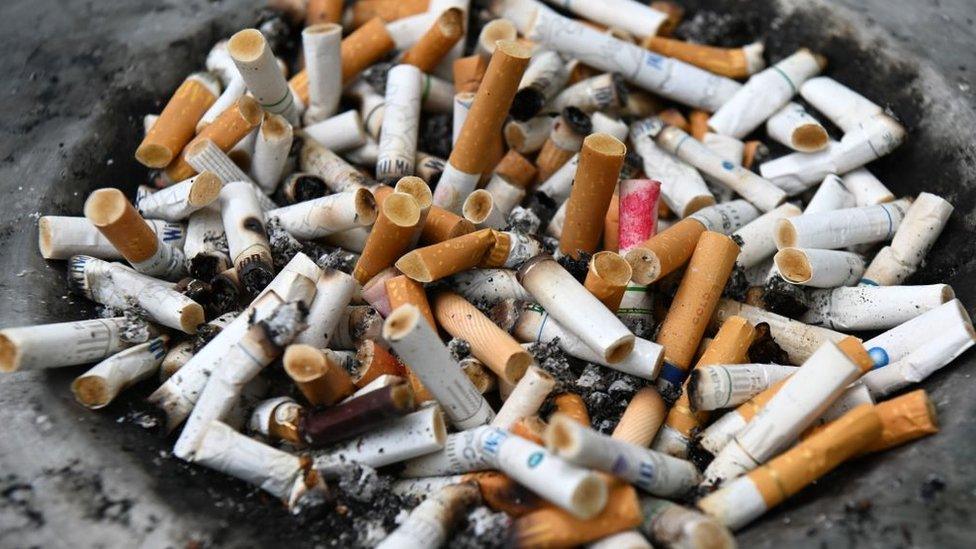
Cigarette butts are thought to be the world's most common form of litter
Keep Britain Tidy says plastics, arsenic, lead and nicotine from the filters can all leak into the environment and cause harm to marine life. Just one cigarette butt per litre of water can be highly toxic to fish, their research suggests.
A statement sent to the BBC by British American Tobacco - the world's largest publicly traded tobacco company - says the filters "can degrade over a period of between a few months to three-year time period, depending on the environmental conditions".
"Whilst there is currently no feasible alternative to Cellulose Acetate for filters, we continue to seek to reduce the impact of our products on the environment by investing and innovating to test and develop alternative materials, both internally and with third party suppliers."
What are others doing to clean up filters?
The French campaign is not the only attempt to draw attention to cigarette pollution.
In Germany, Berlin resident Stephan von Orlow has launched a petition in June calling for a deposit on cigarettes. So far, it has attracted more than 52,000 signatures, external.
Smokers would pay 20 cents per cigarette, or an extra four euros (£3.68; $4.47) per pack. Pocket ash trays would be issued, so people could safely collect and return the butts to the shop and would get their deposit back.
'Why I'm picking up a million cigarette butts'
Mr von Orlow tells the BBC he and his local campaign group Aufheber, external have been picking up cigarette butts for years.
"But we found out its very, very hard to collect all these cigarettes you find," the 49-year-old Berliner says. "We decided to search for a process that would make sure no butts end up in nature any more."
German cigarette industry heads have already invited the campaigners for a discussion in September. "There's a lot of interest in this," Mr von Orlow says.
People worldwide are increasingly aware of the pollution caused by these butts. A recently released study suggested discarded cigarette butts can hinder plant growth.
Only last month, a photo appeared on Facebook showing a bird on a beach in Florida trying to feed a cigarette butt to its chick - an image the UK's RSPB described as "heartbreaking".
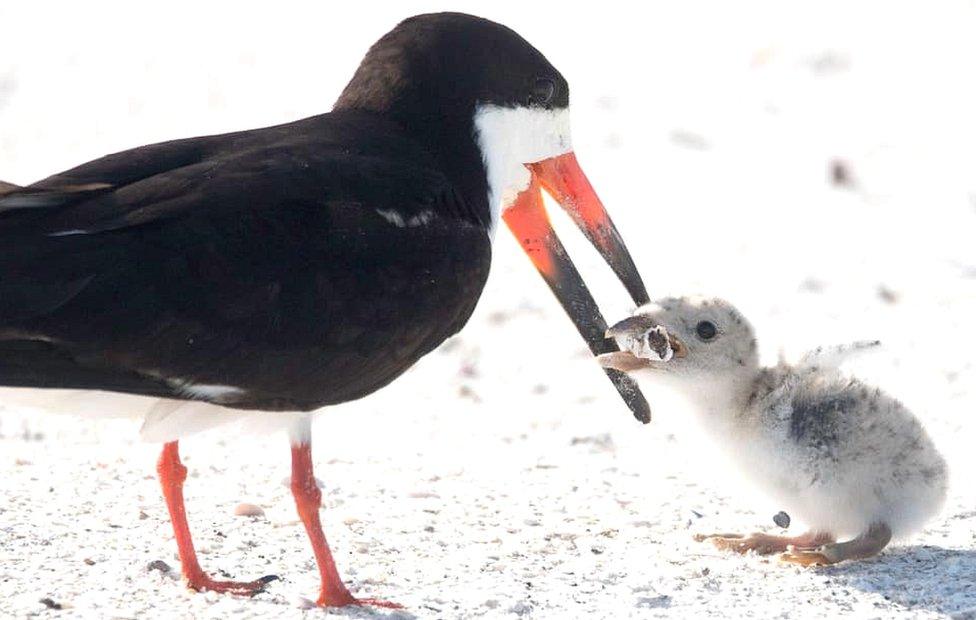
- Published19 July 2019
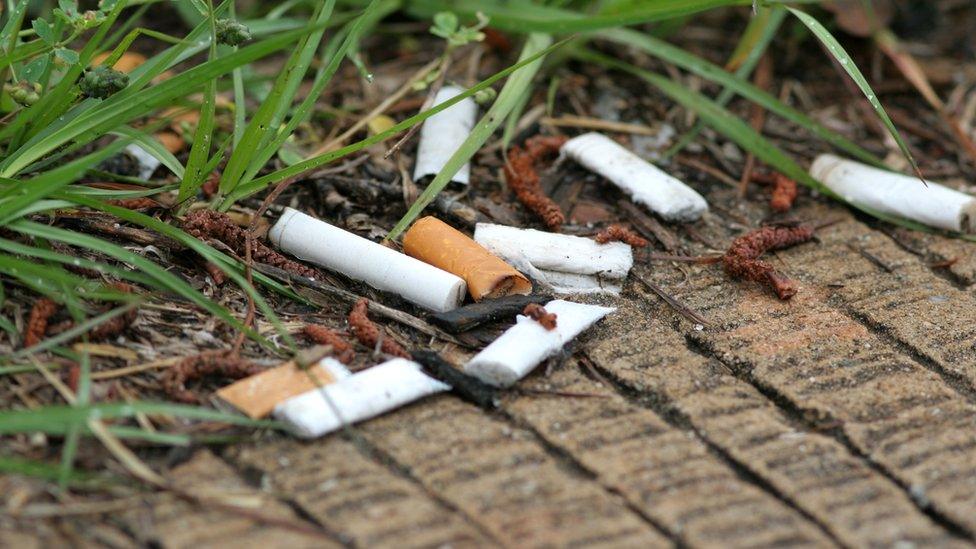
- Published2 July 2019
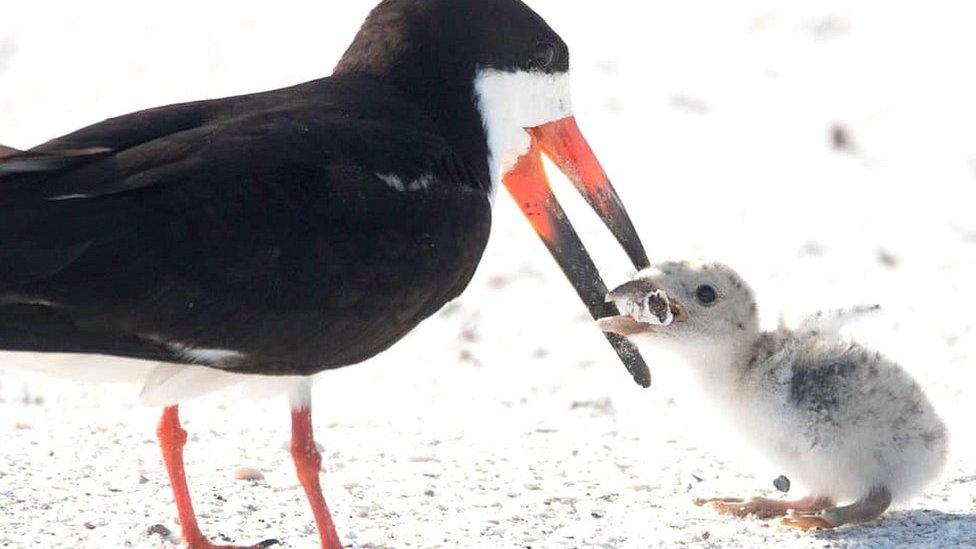
- Published1 July 2019
